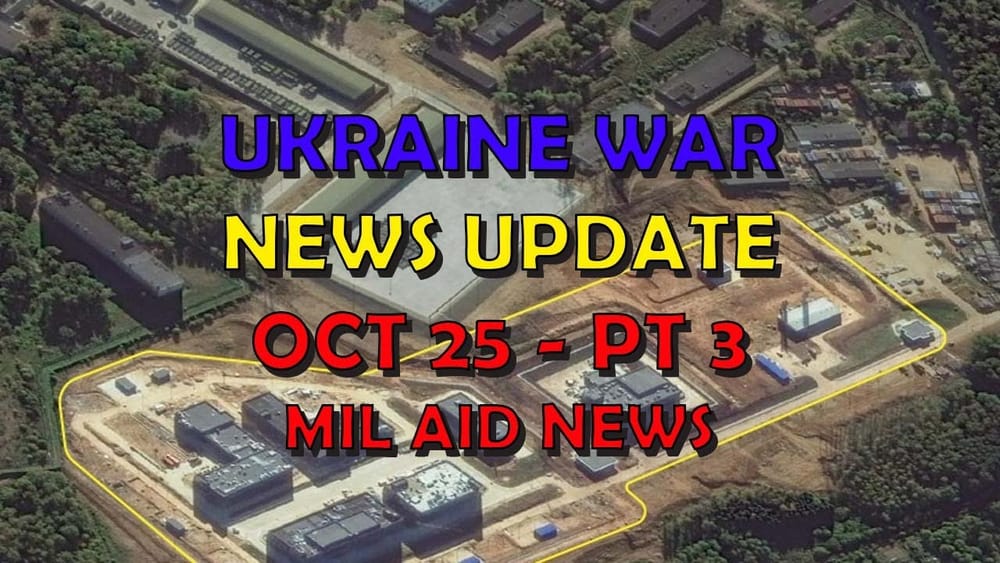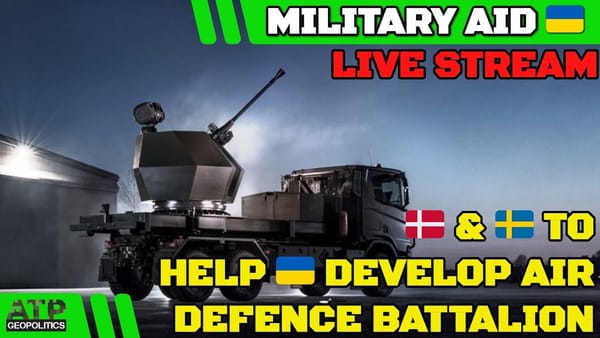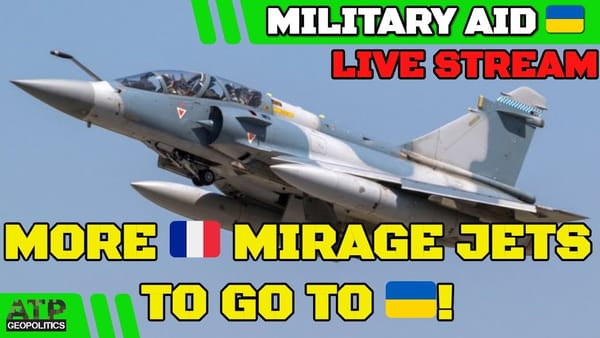Ukraine War Update NEWS: Military Aid News
Table of Contents 📖
"Fear and a desperate hope of being able to portray himself as a peace chancellor shortly before Germany's federal election next year have become Scholz's dominant motives."
Hello Team
🎦 00:00-00:16⏩
Jonathan welcomes viewers to another Ukraine War Update, the third part for the 25th of October 2024. He acknowledges that the previous video was long and hopes this one will be shorter. This update will focus on military aid news.
Return to top⤴️
Germany: Friedrich Merz Critiques Scholz, Champions Ukraine Support
🎦 00:16-01:28⏩
Jonathan discusses an article in the Kyiv Independent by Friedrich Merz, leader of Germany's Christian Democratic Union (CDU).
- Merz criticizes the cancellation of the Ramstein Conference, seeing it as a missed opportunity for Europe to show leadership in aiding Ukraine.
- He positions himself as a strong supporter of Ukraine, potentially succeeding Olaf Scholz.
- Merz advocates for a firmer stance against Russia, proposing actions like lifting range limits on weapons supplied to Ukraine if Russia continues striking civilian targets.
Europe's Missed Opportunity for Leadership as US Support Wanes
🎦 01:28-05:50⏩
- Merz argues that with Biden on a farewell tour before the US election, Europe missed an opportunity to take the lead in supporting Ukraine.
- He criticizes Scholz's focus on portraying himself as a "peace chancellor" and lacking decisive action.
- Jonathan agrees, highlighting the need for strong leadership in Europe to unite support for Ukraine.
- He mentions Macron's earlier attempts and speculates whether Merz could fill that role.
EU Defence Spending: Can Europe Replace US Support?
🎦 05:50-07:45⏩
Jonathan discusses the Financial Times, quoting Shashank Joshi's observation that EU militaries can't match US support for Ukraine.
- He acknowledges this but points out Europe's potential to increase defence spending and domestic production.
- Jonathan highlights concerns about a potential Trump administration lifting sanctions on Russia.
- He stresses the significance of sanctions, suggesting they're crucial to the war effort.
- Jonathan quotes an unnamed EU diplomat who worries about insufficient defence spending, predicting that a Trump win would necessitate a massive increase.
- He concludes that the US election holds significant weight and questions if the EU is overly reliant on the US.
US Aid and Production Capacity: Artillery Shells and the Public Sector
🎦 07:45-08:42⏩
Jonathan acknowledges the US's unique ability to provide immediate aid due to its vast stockpiles and production capacity.
- He cites the example of 155mm artillery shell production, where the US has responded more quickly than Europe.
- Jonathan attributes this to the US's public ownership of some ammunition plants, allowing for rapid production increases without profit-driven delays.
UN and Partners Aid to Ukraine
🎦 08:42-08:56⏩
- Jonathan reports that the UN and its partners have allocated $20 million to aid vulnerable Ukrainians, including orphans, the elderly, people with limited mobility, and internally displaced persons (IDPs).
Germany: Rheinmetall Delivers 20 Marder IFVs to Ukraine
🎦 08:56-09:26⏩
- Rheinmetall has delivered 20 more Marder 1A3 Infantry Fighting Vehicles (IFVs) to Ukraine, bringing the total to approximately 200.
- Jonathan notes the high rate at which Ukraine is using IFVs, especially in areas like Kupiansk, emphasizing the need for continuous supply.
Ukraine's Domestic Drone and Missile Production
🎦 09:26-12:54⏩
- Jonathan discusses an article in the Kyiv Independent, highlighting comments by Oleksandr Kamyshin, former Strategic Industries Minister and current advisor to Zelensky.
- Ukraine seeks funding to expand its domestic long-range weapon production, including drones and missiles.
- Jonathan points to an existing $800 million US aid package for this purpose.
- He believes the West should have supported Ukraine's indigenous production earlier.
- Kamyshin emphasizes Ukraine's ability to strike deep into Russia and the need for financial backing from allies.
- Jonathan mentions a reported $10 billion funding gap between Ukraine's production potential and actual support.
- Ukraine aims to leverage its battlefield experience to produce sophisticated weaponry.
- Commitments for funding Ukrainian-made deep strike capabilities have come from the US, Denmark, and Lithuania.
- The UK has pledged around $3 billion for long-range drone production.
- Jonathan is encouraged by the money flowing into this sector but hopes production can ramp up quickly enough to make a difference.
Shifting Warfare: From "Dumb Bombs" to "Precise Mass"
🎦 13:54-16:18⏩
- Jonathan transitions to discussing the evolution of warfare, moving from mass bombardment to precision strikes.
- He mentions Russia's initial reliance on "dumb bombs" and their current efforts to convert them into guided glide bombs.
- Jonathan contrasts this with the West's focus on precision weaponry like HIMARS.
- He argues that the future might lie in combining mass and precision, citing the example of drone swarms that are both numerous and accurate.
Iran to Produce Russian Su-30 and Su-35 Fighter Jets: Implications
🎦 16:19-17:08⏩
- Iran has reportedly received permission to produce Russia's Su-30 and Su-35 fighter jets.
- Jonathan expresses concern, as this could shield Iranian factories from Ukrainian strikes and bolster Russia's air power.
- He notes that while Russia struggles with sanctions and component shortages, Iran might be better positioned for this production.
Russia's Reliance on Foreign Ammunition: North Korea and Iran
🎦 17:09-18:57⏩
- Jonathan cites a Bloomberg report revealing that only 30% of shells fired by Russian forces were actually Russian-made.
- The majority (60%) came from North Korea, with the remaining 10% from Iran.
- North Korea has reportedly supplied about 8 million artillery shells since August of the previous year.
- Additionally, Hwasong-11 missiles and Bullseye-4 anti-tank weapons of North Korean origin have been observed in Ukraine.
- Jonathan highlights the positive news from Yonhap (a South Korean news agency) that North Korea has only three months' worth of artillery ammunition left to supply Russia.
- Russia's artillery fire ratio has decreased to 2:1 compared to Ukraine's, down from 7:1 earlier in the war.
- Jonathan sees this as a significant improvement for Ukraine, potentially impacting Russia's ability to provide effective artillery support.
- However, he notes that Russia seems to be compensating for reduced artillery use by deploying more guided glide bombs.
North Korea to Send More Troops to Russia
🎦 19:09-19:40⏩
- South Korean intelligence reports indicate North Korea will send additional troops to aid Russia.
- A first group of 1,500 special forces is reportedly training in Russia's Far East, part of a potential deployment of 100,000 soldiers.
- Jonathan expresses concern about this development.
Russia's Biological Weapons Facility: Concerns and History of Deception
🎦 19:40-21:15⏩
- Jonathan discusses concerns over activity at a Russian biological weapons facility called Sergiev Posad-6.
- Once a major bioweapons research center, the site has been inactive for decades but is now seeing new construction, raising alarms among US intelligence and bioweapons experts.
- Jonathan quotes a bioweapons expert expressing concern over Russia's history of lying about biological and chemical weapons programs.
Wrap Up
🎦 21:15-21:19⏩
Jonathan concludes the update and signs off.
Return to top⤴️




